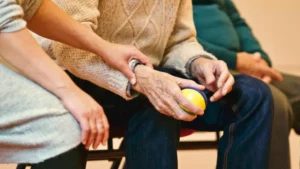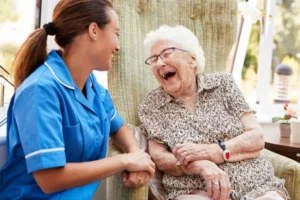As our loved ones age, they naturally experience changes in their physical and emotional well-being. If you’ve noticed that your elderly mother always seems unhappy, it’s important to understand the potential underlying causes and explore ways to support her. Many caregivers question what to do when they find themselves saying, “My Elderly Mother is Never Happy!” Addressing it requires compassion, patience, and a willingness to delve into the complexities of aging.
In this article, we’ll explore what might make your mom feel down and offer some handy tips for helping her through it. So, let’s get started on making things better for her.
Exploring the Causes of Unhappiness in the Elderly
Physical Health Issues
Answering the question “Why is my elderly mother never happy?” may lie in understanding how her chronic health conditions and physical decline affect her overall well-being and ability to live comfortably. As we age, dealing with ongoing health problems is very common. Around 80% of older adults have at least one chronic condition, and half of them have more than one, according to the Centers for Disease Control and Prevention (CDC). Imagine dealing with discomfort or restricted movement daily—it will take a toll on anyone’s mood and outlook.

Mental Health Challenges
Mental health issues are pretty common among older adults, so if you’re still scratching your head over “why is my elderly mother never happy,” it could very well be related to her dealing with anxiety, depression, or other mental health challenges. The WHO stats show that around 14% of people aged 60 and up are struggling with mental issues of some kind, with depression and anxiety being the most common culprits. These mental health issues can be worsened by feelings of loneliness and isolation, which are more likely as our social circles shrink with age.
Loss of Independence
Independence is precious, regardless of age. For many elderly individuals, the gradual loss of independence can be a bitter pill to swallow. Dependence on others for everyday tasks or decisions can evoke frustration, helplessness, and unhappiness. Maintaining a sense of autonomy is crucial for mental and emotional well-being.
Grief and Loss
Grief knows no age limit. Even if your mom looks fine and does things on her own, losing loved ones can affect her for a long time. Grief can present itself in different ways, including anger, sadness, and a general lack of joy, even years after the initial loss. When someone or something important dies, it can make her feel empty and upset. Talking about grief and loss can help you understand why your mom isn’t happy. Being kind, listening, and staying close can help her feel better.
Signs of Unhappiness in Elderly Individuals
- Behavioral Changes: Watch how your elderly mom acts. She might be unhappy if she seems grumpy, upset, or just not herself. Notice if she does things differently than before. These changes can show how she’s feeling inside.
- Physical Symptoms: When the elderly aren’t happy, it can show in their bodies. Pay attention to any complaints your mom has about aches and pains, feeling overly tired or weary, or changes in her appetite and weight. However, it’s crucial to rule out any bigger health problems that could be causing or contributing to those symptoms in the first place.
- Withdrawal from Social Activities: Pulling back from social activities and interactions can be another red flag that your mother may be unhappy. If you’ve seen your mother becoming more isolated and withdrawn, losing interest in social gatherings or hobbies she used to enjoy, it could signal that something bigger is weighing on her mind and impacting her overall happiness.
How to Support Your Elderly Mother

Encourage Open Communication
Creating a supportive environment starts with open communication. Encourage your elderly mother to express her feelings and concerns without fear of criticism or dismissal. If she can’t open up to you, don’t be discouraged. She may need someone her age who can understand her better.
You could encourage her to join a senior support group or something like that where she can talk to people who are going through similar things. Listening to her and showing that you care can help her feel heard and understood, even if she’s not talking directly to you.
Promote Physical & Mental Health
Prioritize your mother’s physical and mental well-being by ensuring she goes for regular check-ups with her doctor. These check-ups are crucial for catching any health issues early and keeping her in tip-top shape. Encouraging her to stay active is just as important.
Physical activity keeps her body strong and boosts her mood and overall well-being. So, whether it’s a walk in the park, a gentle yoga session, or even dancing around the living room, finding ways to keep her moving can do wonders for her health and happiness.
Enhance the Quality of Life
Small gestures can make a big difference in enhancing your elderly mother’s quality of life. Whether arranging outings with family members, exploring new hobbies together, or simply spending quality time chatting over a cup of tea, these moments of connection can brighten her spirits. For those of you who are doing long-distance caregiving, make time for regular video calls or phone chats. These moments of connection, whether in person or through technology, can remind her that she’s loved and cared for.
“My Elderly Mother is Never Happy”: How In-Home Care Can Help

- Companionship and Social Interaction: One of the most significant benefits of in-home care is companionship and social interaction. Having a friendly and caring professional caregiver in her home makes a difference. In-home care services can provide invaluable companionship and social interaction for your elderly mother by engaging her in meaningful conversations, accompanying her on outings, and providing emotional support during challenging times.
- Assistance with Daily Activities: Let’s face it, as we get older, even simple daily routines can start to feel challenging. With in-home care services, your mother can get support for activities like bathing, dressing, preparing meals, and light housekeeping. That extra assistance helps alleviate stress and frustration, improving her mood and well-being.
- Professional Support for Health Management: Our in-home caregivers are trained professionals who can help monitor your mother’s overall health. They can remind her to take medications and help ensure her safe and comfortable living environment. This level of professional support can significantly improve her physical and mental health.
End Note
To understand “why is my elderly mother never happy,” you need to look at the whole picture, considering her physical health, emotional state, and social connections. By recognizing the underlying causes of her unhappiness and taking proactive steps to support her, you can help enhance her overall well-being and quality of life. Remember, small gestures of love and kindness can make a difference in brightening her days.
If you need professional support, don’t hesitate to consult with our team at Sunny Days In-Home Care. Our compassionate team is here to partner with you in keeping your beloved mother comfortable, engaged, and happy in her golden years. We believe a little love and kindness from you and our caregivers can brighten your mom’s days.

